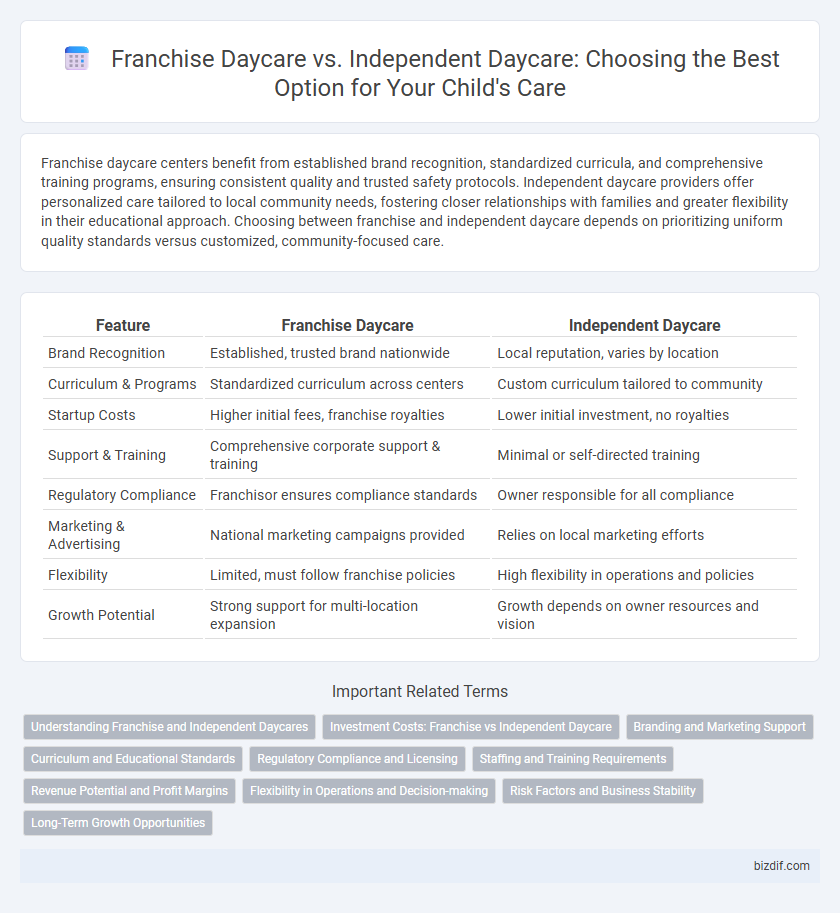Franchise daycare centers benefit from established brand recognition, standardized curricula, and comprehensive training programs, ensuring consistent quality and trusted safety protocols. Independent daycare providers offer personalized care tailored to local community needs, fostering closer relationships with families and greater flexibility in their educational approach. Choosing between franchise and independent daycare depends on prioritizing uniform quality standards versus customized, community-focused care.
Table of Comparison
| Feature | Franchise Daycare | Independent Daycare |
|---|---|---|
| Brand Recognition | Established, trusted brand nationwide | Local reputation, varies by location |
| Curriculum & Programs | Standardized curriculum across centers | Custom curriculum tailored to community |
| Startup Costs | Higher initial fees, franchise royalties | Lower initial investment, no royalties |
| Support & Training | Comprehensive corporate support & training | Minimal or self-directed training |
| Regulatory Compliance | Franchisor ensures compliance standards | Owner responsible for all compliance |
| Marketing & Advertising | National marketing campaigns provided | Relies on local marketing efforts |
| Flexibility | Limited, must follow franchise policies | High flexibility in operations and policies |
| Growth Potential | Strong support for multi-location expansion | Growth depends on owner resources and vision |
Understanding Franchise and Independent Daycares
Franchise daycares operate under established brand standards, providing consistent curricula, marketing support, and operational guidelines, which can ensure reliability and recognized quality for parents. Independent daycares offer more flexibility in program design and personalized care, often reflecting the unique values and needs of the local community. Understanding the differences in management structure, branding, and resource availability helps parents make informed decisions about early childhood education options.
Investment Costs: Franchise vs Independent Daycare
Franchise daycare centers typically require higher initial investment costs due to franchise fees, branding, and mandatory training programs, often ranging from $50,000 to $500,000 depending on the brand and location. Independent daycare centers usually have lower startup expenses, primarily involving facility leasing, licensing, and staffing, which can start as low as $10,000 to $100,000. Franchise models offer structured support and marketing advantages, while independent daycares allow greater flexibility in budget allocation and operational decisions.
Branding and Marketing Support
Franchise daycares benefit from established branding and comprehensive marketing support, leveraging national or regional campaigns to attract families and build trust quickly. Independent daycares often rely on localized marketing efforts and personal reputation, which can limit visibility but allow for tailored community engagement. Strong branding in franchised daycares drives enrollment through recognizable logos, standardized materials, and digital presence that independent centers may find costly to replicate.
Curriculum and Educational Standards
Franchise daycares typically follow a standardized curriculum developed by educational experts, ensuring consistent adherence to nationally recognized early childhood education standards. Independent daycares often have more flexibility to tailor their curriculum to local community needs but may vary widely in educational quality and program structure. Parents should carefully evaluate accreditation, teaching qualifications, and curriculum alignment with developmental milestones when choosing between franchise and independent daycare options.
Regulatory Compliance and Licensing
Franchise daycare centers typically adhere to standardized regulatory compliance and licensing requirements mandated by both local and franchise policies, ensuring consistent safety and quality across all locations. Independent daycares must navigate state and local licensing individually, which can result in variable adherence to regulations depending on resources and expertise. Emphasizing thorough compliance is crucial for both models to maintain legal operation and foster trust among parents.
Staffing and Training Requirements
Franchise daycares benefit from standardized staffing protocols and comprehensive training programs developed by the parent company, ensuring consistency in caregiver qualifications and child safety. Independent daycares may have more flexible hiring practices but often face challenges in maintaining uniform training standards and may lack access to advanced development resources. The structured training in franchise models supports regulatory compliance and enhances caregiver skills, while independent centers rely heavily on local expertise and tailored staff development approaches.
Revenue Potential and Profit Margins
Franchise daycare centers often benefit from established brand recognition and standardized operational procedures, leading to higher revenue potential and consistent profit margins. Independent daycares may face variability in income, but can achieve greater profit margins through flexible pricing and personalized services. Investing in a franchise typically involves franchise fees and royalties, which can impact net profitability compared to independently owned daycares.
Flexibility in Operations and Decision-making
Franchise daycares often follow standardized policies and curricula set by the parent company, limiting flexibility in operations and decision-making to maintain brand consistency. Independent daycares have greater autonomy to tailor programs, schedules, and operational practices to meet local community needs and preferences. This flexibility enables independent centers to quickly adapt to changes and innovate based on direct feedback from parents and staff.
Risk Factors and Business Stability
Franchise daycare centers typically benefit from established brand recognition, proven operational systems, and ongoing corporate support, which reduce risk factors and enhance business stability. Independent daycare providers face higher uncertainty due to limited access to marketing resources, variable local competition, and the need to develop proprietary business models from scratch. Evaluating financial investment, regulatory compliance, and market demand is crucial for both models to mitigate risks and ensure sustainable growth.
Long-Term Growth Opportunities
Franchise daycares benefit from established brand recognition, proven business models, and comprehensive training programs, which significantly enhance their long-term growth potential. Independent daycares, while offering greater flexibility and personalized service, may face challenges in scaling due to limited marketing resources and operational support. Consistent revenue streams and national advertising campaigns typically give franchise daycares a competitive edge in securing sustained expansion and market penetration.
Franchise daycare vs independent daycare Infographic

 bizdif.com
bizdif.com